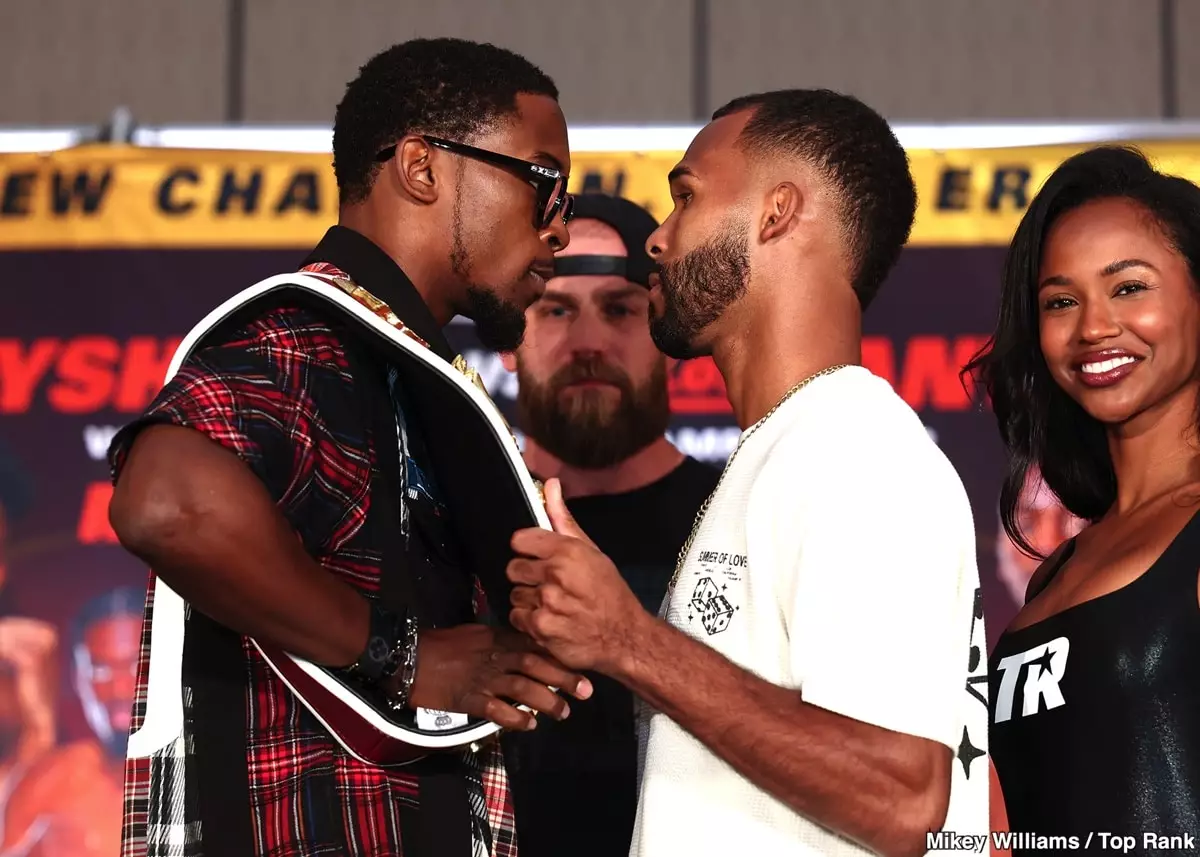In a world where boxing champions are defined not just by their skill but also by their willingness to step into the ring, the recent actions of fighter Keyshawn Davis have raised eyebrows and sparked heated discussions within the sport. Last Saturday’s canceled matchup against Edwin De Los Santos was not merely an inconvenience for fans and promoters; it was a reflection of Davis’s mental state and perhaps his unwillingness to face a rival who could expose vulnerabilities he might not be ready to confront.
When a fighter weighs in at a staggering 4.3 pounds over the lightweight limit, it sends shockwaves through the boxing community. Critics, including Davis’s trainer Greg Hackett, have interpreted this as a deliberate ploy, a self-sabotage reflecting Davis’s psychological fear, particularly in light of the fighter’s history with De Los Santos. It raises the question: was he truly unprepared, or was he intentionally avoiding what he perceived as an unwinnable fight?
Strategic Avoidance vs. Genuine Oversight
The idea that Davis might have intentionally missed the weight prompts a deeper analysis of his motivations. The weight discrepancy might suggest more than just a lack of discipline; it could indicate a calculated maneuver to escape a potentially damaging fight. Such behavior could signal a deeper issue: the fear of failure that many athletes confront but rarely admit.
Hackett’s candid comments shed light on this perspective. He noted that Keyshawn appeared unmotivated, possibly underestimating the importance of rigorous training and discipline. This attitude raises concerns about Davis’s professional future; if he continues to view challenges as obstacles to be evaded rather than opportunities to be embraced, he risks being sidelined by his competitors and the very sport he professes to love.
Intimidation and the Shadow of Cruz
Even more striking than the weight misstep is Davis’s apparent intimidation by his past opponent, Andy Cruz. Davis’s admission of fear stems from a damaging history in the amateurs—four losses to Cruz. This past haunting reflects not just on his confidence but on his readiness to confront adversity in the ring. Hackett’s observation about Davis’s demeanor when Cruz approached him with bravado hints at a lack of readiness to face not only physical challenges but psychological ones as well.
Fighting is as much about mental fortitude as it is about physical prowess. In boxing, your competitor is often just as fearsome outside of the ring as they are inside it. Davis’s reaction, peering timidly at Cruz instead of rising to the challenge, suggests unresolved issues that could continue to cloud his judgment and performance.
The Unwritten Rules of Accountability
At the center of this debacle lies a question of accountability. While some fighters publicly slink away from their responsibilities, Keyshawn’s situation confronts us with the uncomfortable reality of how athletes can balance vulnerabilities while maintaining the facade of strength. If Davis truly wants to solidify his place among elite fighters, he must learn to confront his challenges head-on, rather than dodge them behind the guise of weight classes and promotional tactics.
The crux of Hackett’s critique touches on the societal tendency to allow athletes to be less than accountable. What does it say about a fighter who lets fear dictate their actions? In an era where mental health issues in sports are finally receiving the attention they deserve, can Davis’s actions be framed through a lens of psychological wellness? Or do they signify a more troubling trend where fear trumps ambition?
Implications for the Boxing Landscape
Davis’s actions reverberate beyond his career; they signal an unsettling trend in boxing. As fighters like Davis weigh their options between fleeing from competition or accepting challenges, they undermine the very ethos of the sport: bravery and resilience. Boxing fans deserve athletes who are willing to engage in the ring, not ones who manipulate the circumstances to avoid it.
Whether Keyshawn Davis learns from this situation and transforms his approach to competition or continues down a path of retreat will greatly shape his career and could redefine how emerging athletes view challenges. In a sport that valorizes grit, commitment, and fortitude, one has to wonder if Davis can build his career on a foundation of courage or if he will forever remain a reluctant figure in the ring.

